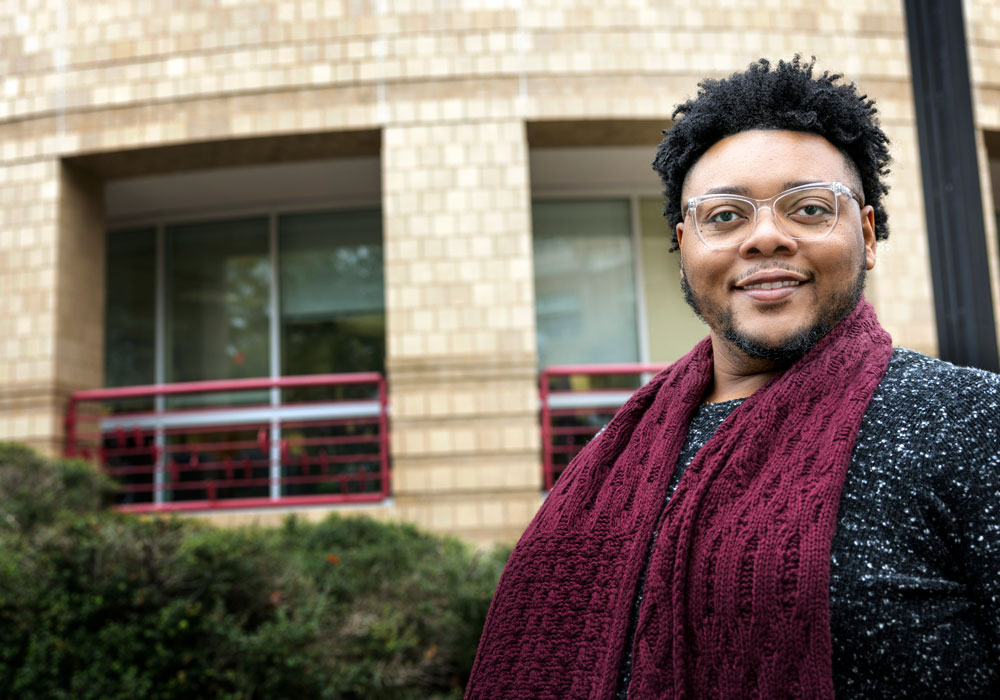When tenor Johnnie Felder finished his bachelor’s in music at Benedict College in 2011, he went straight into the master’s program in vocal performance at the University of South Carolina. But when he finished the master’s two years later, he had no intention of staying on for a doctoral degree.
He liked teaching voice, but he didn’t necessarily need to be a professor. And he loved performing, even if that meant spending as much time on the road as he spent on stage or in the classroom. He was a working performer, and he was more or less happy with that lifestyle — until a mentor and friend gave him a nudge.
“I was teaching at a small private arts academy, and I was still gigging and performing — it was an interesting and busy time,” he says. “But then one of my mentors, Donald Holland, who also went to USC, just asked me one day, ‘What are you doing?’ I'm like, ‘You know. I'm just working, making money, paying bills.’ He’s like, ‘No, what are you doing? When are you going back to school?’ ”
Felder tried to shrug off Holland’s advice, but Holland wouldn’t let it go. Felder laughs: “He just kind of grabbed me by the neck and said, ‘You need to go back to school. You need to finish so you can go on and do something.’ ”
And so he circled back to USC, where he enrolled in the DMA program for vocal performance and landed an assistantship teaching voice, mostly to instrumentalists. He also taught private voice lessons through the university.
But that doesn’t mean he gave up all that gigging or extra teaching. He has performed multiple times at Spoleto Festival, USA, and with Opera Carolina in Charlotte, where he is an artist-in-residence. In 2019, he performed Puccini’s Gianni Schicchi at Varna International Music Academy in Varna, Bulgaria. He is also scheduled to sing with the North Carolina Opera in Chapel Hill in 2023.
Meanwhile, he has held teaching assignments at Benedict College, Allen University, South Carolina State University, Augusta University and Paine College, and teaches voice and diction at the USC School of Music. He has worked as a vocal coach and teacher for North Augusta High School and Cardinal Newman Catholic School in Columbia and elsewhere.
“I enjoy teaching, but I also enjoy performing, so for the last few years I’ve been doing both simultaneously,” he says. “It's not necessarily the easiest thing to do. In fact, it’s quite difficult. But it’s difficult in a great way. It's always go, go, go, go, go. I spend a lot of time on the interstate.”
Of course, he also spent a lot of time working on his dissertation. Entering the program, he knew he wanted to focus on the contributions of Black composers, and he initially considered researching a prominent Black tenor who sang for the Metropolitan Opera — “Representation is very important,” he says — but he changed his mind after a conversation with Birgitta Johnson, an associate professor of ethnomusicology and African American studies.
“Honestly, I’m an advocate for students. I just want to be in a place where I can grow artistically and pedagogically but also help the students grow — and hopefully, if I’m lucky, help build a fine music program.”
Johnson had previously directed a dissertation by a Ph.D. candidate in orchestra who compiled a compendium of orchestral pieces by Black composers. Why not do something similar for Black art songs, a genre near and dear to Felder’s heart?
The result: Timeless Light: A Singer’s Compendium of Black Art Songs for Tenor by Black Composers. All told, it features 331 art songs, suitable for tenor, by Black composers, though Felder points out there are many more often-forgotten works by Black composers.
“These are songs that are underrepresented in the classical music canon,” he says. “We always hear about Schubert, Quilter, Copland and others who wrote art songs, not necessarily operatic literature, but we don’t hear about Harry Burleigh, Robert Owens, Margaret Bonds or Florence Price.”
And the dissertation was not written strictly for academics. The goal, he says, is to provide a document that can be used by teachers, performers and students who want to program literature that has traditionally been underrepresented and infrequently performed.
“This repertoire can be sung by anyone,” he says. “Obviously, there are some pieces that might not be suitable for a person who is not of color — songs about the experience of Negroes in a past time, for example — but for the most part, while these songs are written by Black or brown composers, they can be sung by anyone.”
That could mean Felder handles the singing himself or that could mean he hands a performance off to a future student wherever he ultimately lands with his freshly minted Ph.D.
“Honestly, I’m an advocate for students,” he says. “I just want to be in a place where I can grow artistically and pedagogically but also help the students grow — and hopefully, if I’m lucky, help build a fine music program.”
